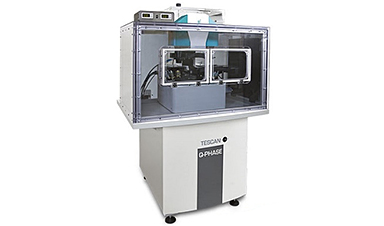The University of North Florida Materials Science and Engineering Research Facility (MSERF) has partnered with TESCAN, a leading manufacturer of electron and light microscopes, in the installation of one of its new Q-Phase microscopes, a unique instrument for quantitative phase imaging based on holographic microscopy.
The Q-Phase microscope is a one-of-a-kind holographic microscope capable of imaging live cells for up to five days. Traditional light microscopy of cells requires staining and chemical treatments that capture the state of the cell in time but kills the cell in the process. This new technology allows cells to be imaged while living over the course of days.
“The partnership with TESCAN affords the University the ability to gather cutting-edge data from the latest high-tech equipment” said Dr. Paul Eason, UNF-MSERF director and associate professor of mechanical engineering in the College of Computing, Engineering and Construction.
The agreement between the University and TESCAN provides UNF the opportunity to house brand new and unique microscopes for the purpose of instrument validation and demonstration for potential users. The Q-Phase microscope, housed at MSERF in the newly renovated Skinner-Jones Hall, is on the UNF campus for a 90-day trial installation.
Researchers both at UNF and the Mayo Clinic are taking advantage of the trial installation and utilizing the high-powered device in their respective studies of treating various types of cancer.
Image Credit: AZO Nano
News This Week
Team finds flawed data in recent study relevant to coronavirus antiviral development
The COVID pandemic illustrated how urgently we need antiviral medications capable of treating coronavirus infections. To aid this effort, researchers quickly homed in on part of SARS-CoV-2's molecular structure known as the NiRAN domain—an [...]
Drug-Coated Neural Implants Reduce Immune Rejection
Summary: A new study shows that coating neural prosthetic implants with the anti-inflammatory drug dexamethasone helps reduce the body’s immune response and scar tissue formation. This strategy enhances the long-term performance and stability of electrodes [...]
Scientists discover cancer-fighting bacteria that ‘soak up’ forever chemicals in the body
A family of healthy bacteria may help 'soak up' toxic forever chemicals in the body, warding off their cancerous effects. Forever chemicals, also known as PFAS (per- and polyfluoroalkyl substances), are toxic chemicals that [...]
Johns Hopkins Researchers Uncover a New Way To Kill Cancer Cells
A new study reveals that blocking ribosomal RNA production rewires cancer cell behavior and could help treat genetically unstable tumors. Researchers at the Johns Hopkins Kimmel Cancer Center and the Department of Radiation Oncology and Molecular [...]
AI matches doctors in mapping lung tumors for radiation therapy
In radiation therapy, precision can save lives. Oncologists must carefully map the size and location of a tumor before delivering high-dose radiation to destroy cancer cells while sparing healthy tissue. But this process, called [...]
Scientists Finally “See” Key Protein That Controls Inflammation
Researchers used advanced microscopy to uncover important protein structures. For the first time, two important protein structures in the human body are being visualized, thanks in part to cutting-edge technology at the University of [...]
AI tool detects 9 types of dementia from a single brain scan
Mayo Clinic researchers have developed a new artificial intelligence (AI) tool that helps clinicians identify brain activity patterns linked to nine types of dementia, including Alzheimer's disease, using a single, widely available scan—a transformative [...]
Is plastic packaging putting more than just food on your plate?
New research reveals that common food packaging and utensils can shed microscopic plastics into our food, prompting urgent calls for stricter testing and updated regulations to protect public health. Beyond microplastics: The analysis intentionally [...]














Leave A Comment